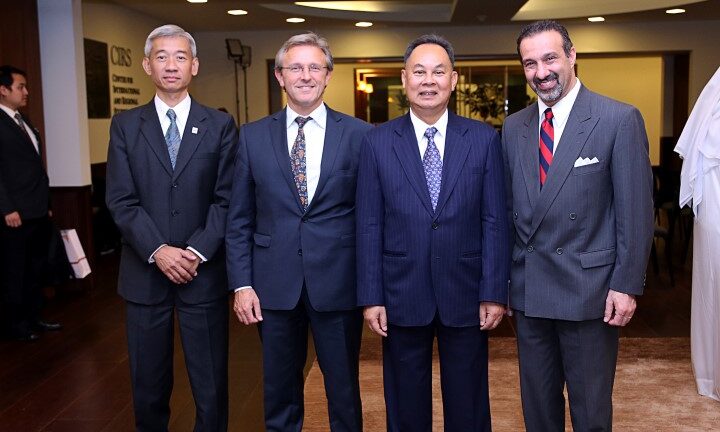Dialogue Series, Distingushed Lectures, Regional Studies
H.E. Kasit Piromya on Southeast Asia's Role in Global Food Security

Former Foreign Minister of Thailand and career diplomat Kasit Piromya was the featured speaker for a CIRS Monthly Dialoguelecture on January 22, 2013. His Excellency Piromya’s talk, titled “Southeast Asia’s Role in Global Food Security,” focused on the role of Southeast Asian countries as major exporters of food and as the “food cradle” or “food kitchen” of the world.
According to Piromya, when combined, Southeast Asian countries rank in the top ten global food producers and exporters. “There is no food shortage and there is no famine in Southeast Asia so we feel confident that we can be the supplier of food for the decades to come,” he said.
Addressing the important connections between Southeast Asian countries and the Gulf Cooperation Council (GCC) states, Piromya pointed to the great potential for long-lasting cooperative agreements between the two sides. He noted that Gulf states are secure in oil, gas, and energy, whilst Southeast Asian countries enjoy food security. This presents optimum grounds for partnerships and working together to achieve common goals and mutually beneficial arrangements where one part of the world has particular resources that can be of benefit to other areas of the globe. “The first thing that comes to mind,” Piromya claimed, “is the complementarity of Southeast Asia and the Gulf states.”
Despite this natural partnership between Southeast Asian countries and the Gulf states, major questions remain regarding how this complementarity between food security cooperation and energy security cooperation can be achieved. Piromya offered several possible scenarios for cross-regional cooperation.
The first, he said, is for the trading partners to establish and agree upon long-term contracts to trade food and energy resources. Another option is for Gulf states to enter into joint venture agreements with existing Southeast Asian organizations to actively invest in farms and related activities in Southeast Asian countries. This scenario will allow Gulf investors to work directly with food production experts in order to increase productivity and returns on investment. A final suggestion is to create stockpiles of food that can be kept in storage and utilized as and when needed. He explained that “Thailand, as a major food exporting country, pledged 50,000 tons of rice into the stockpile for emergency situations.” These stockpiles can be stored on land or in the form of “floating stockpiles” on ships that are directed towards areas of need anywhere in the world. This option requires that countries maintain emergency stockpiles ready to deploy in disaster situations and that countries work in conjunction with international organizations like the World Food Programme to deliver food aid to countries in need. For example, “when there was an earthquake in Haiti a few years back, Thailand was the biggest contributor in terms of humanitarian assistance; we provided the largest amount of rice,” he said.
Countries in Southeast Asia and the Gulf could work together to tackle some of the more prescient global food security issues. In his former capacity as Foreign Minister, Piromya was directly involved in negotiations with the World Food Programme to provide food aid, especially rice, in times of crisis in the Asia Pacific region and on the east coast of Africa. Similarly, “the Gulf states, with so much financial endowments, could also play a very important role in terms of humanitarian assistance,” he said. To this end, it is imperative that ASEAN countries and GCC state leaders establish a more consistent political dialogue between the two regions.
Taking this regional cooperation a step further, Piromya argued for the necessity to go beyond food aid and to think of partnerships that can be maintained at the level of research and development. He concluded by saying that there is great interest in researching and investing in alternative and renewable energy sources in many Southeast Asian and Gulf states. Currently, in Thailand, alternative energy is being produced from food sources such as tapioca, palm oil, and molasses. This is a mutually beneficial area for both regions to work closely together.
Earlier in the day, H. E. Piromya met with Georgetown University SFS-Qatar students to share his experiences as a career diplomat and relay various anecdotes about his forty years in the Thai Foreign Service. Later in the day, he spoke to various ambassadors and embassy staff stationed in Qatar at a luncheon talk organized by CIRS. During the meeting, he discussed his optimism for Qatar’s future in light of the Arab Spring, globalization, and increased liberalization. With the inevitable depletion of natural resources, he argued that Qatar has invested wisely in its future knowledge-based economy. “Qatar will take the future in its own hands, manage the wealth all over the world, and manage itself also as an open society.” As a final thought, Piromya said that Qatar has taken and will continue to take a leading role in many global issues ranging from sports to climate change.
His Excellency Kasit Piromya is a career Thai diplomat, politician, and academic. He previously served as Thailand’s ambassador to Russia, Indonesia, Germany, Japan, and the United States. From 2008 to 2011, he was Thailand’s Minister of Foreign Affairs. Currently, H. E. Piromya is a member of the Thai Parliament representing the Democrat Party.
Article by Suzi Mirgani, Manager and Editor for CIRS Publications.